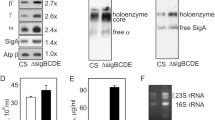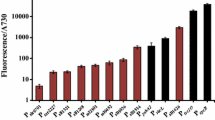Abstract
Translation elongation factors (EFs) are proteins that play important roles during the elongation stage of protein synthesis. In prokaryotes, at least four EFs function in repetitive reactions (EF-Tu, EF-Ts, EF-G, and EF-P). EF-P plays a vital role in the specialized translation of consecutive proline amino acid motifs. It was also recently recognized that EF-P acts throughout translation elongation. Here, we demonstrated for the first time that cell division and morphology are intimately linked to the control of EF-P in the model cyanobacterium Synechococcus elongatus PCC7942. We constructed the overexpression of a wild-type gene product for EF-P (Synpcc7942_2565) as a tool to identify EF-P functionality. The overexpression of EF-P resulted in the morphological plasticity of hyperelongated cells. During the stationary phase, EF-P overexpressors displayed cell lengths of 150 μm or longer, approximately 35 times longer than the control. Total cellular protein and amino acid content were also increased in overexpressors. To explore the molecular mechanisms underlying hyperelongation, gene expression analysis was performed. The results revealed that cell division genes, including ftn6, minD, mreB, mreC, and ftsZ, were modulated in overexpressors. Strikingly, ftn6 was severely down-regulated. Little is known regarding EF-P in prokaryotic photosynthetic organisms. Our results suggest that cyanobacterial EF-P participates in the acceleration of protein synthesis and also regulates cell division processes. These findings suggest new ways to modify translation and metabolism in cyanobacteria. Phenotypic and metabolic alterations caused by overexpressing EF-P may also be beneficial for applications such as low-cost, green molecular factories.
Key points
• Cell division and cell morphology in the cyanobacterium Synechococcus elongatus PCC7942 are closely linked with the control of translation elongation factor P (EF-P).
• Overexpression of EF-P leads to morphological plasticity in hyperelongated cells.
• Cyanobacterial EF-P is involved in the acceleration of protein synthesis and the regulation of cell division processes.








Similar content being viewed by others
References
Atikij T, Syaputri Y, Iwahashi H, Praneenararat T, Sirisattha S, Kageyama H, Waditee-Sirisattha R (2019) Enhanced lipid production and molecular dynamics under salinity stress in green microalga Chlamydomonas reinhardtii (137C). Mar Drugs 17(8). https://doi.org/10.3390/md17080484
Buhr F, Jha S, Thommen M, Mittelstaet J, Kutz F, Schwalbe H, Rodnina MV, Komar AA (2016) Synonymous codons direct cotranslational folding toward different protein conformations. Mol Cell 61(3):341–351. https://doi.org/10.1016/j.molcel.2016.01.008
Cohen SE, McKnight BM, Golden SS (2018) Roles for ClpXP in regulating the circadian clock in Synechococcus elongatus. Proc Natl Acad Sci U S A 115(33):E7805–E7813. https://doi.org/10.1073/pnas.1800828115
Dever TE, Green R (2012) The elongation, termination, and recycling phases of translation in eukaryotes. Cold Spring Harb Perspect Biol 4(7):a013706. https://doi.org/10.1101/cshperspect.a013706
Ducret A, Quardokus EM, Brun YV (2016) MicrobeJ, a tool for high throughput bacterial cell detection and quantitative analysis. Nat Microbiol 1(7):16077. https://doi.org/10.1038/nmicrobiol.2016.77
Espinosa J, Boyd JS, Cantos R, Salinas P, Golden SS, Contreras A (2015) Cross-talk and regulatory interactions between the essential response regulator RpaB and cyanobacterial circadian clock output. Proc Natl Acad Sci U S A 112(7):2198–2203. https://doi.org/10.1073/pnas.1424632112
Gorelova OA, Baulina OI, Rasmussen U, Koksharova OA (2013) The pleiotropic effects of ftn2 and ftn6 mutations in cyanobacterium Synechococcus sp. PCC 7942. Protoplasma 250(4):931–942. https://doi.org/10.1007/s00709-012-0479-2
Green R, Noller HF (1997) Ribosomes and translation. Annu Rev Biochem 66(1):679–716. https://doi.org/10.1146/annurev.biochem.66.1.679
Hummels KR, Kearns DB (2020) Translation elongation factor P (EF-P). FEMS Microbiol Rev 44(2):208–218. https://doi.org/10.1093/femsre/fuaa003
Jordan A, Chandler J, MacCready JS, Huang J, Osteryoung KW, Ducat DC (2017) Engineering cyanobacterial cell morphology for enhanced recovery and processing of biomass. Appl Environ Microbiol 83(9):e00053–e00017. https://doi.org/10.1128/AEM.00053-17
Jorgensen P, Rupes I, Sharom JR, Schneper L, Broach JR, Tyers M (2004) A dynamic transcriptional network communicates growth potential to ribosome synthesis and critical cell size. Genes Dev 18(20):2491–2505. https://doi.org/10.1101/gad.1228804
Klee SM, Sinn JP, Holmes AC, Lehman BL, Krawczyk T, Peter KA, McNellis TW (2019) Extragenic suppression of elongation factor P gene mutant phenotypes in Erwinia amylovora. J Bacteriol 201(11):e00722–e00718. https://doi.org/10.1128/JB.00722-18
Knoot CJ, Ungerer J, Wangikar PP, Pakrasi HB (2018) Cyanobacteria: promising biocatalysts for sustainable chemical production. J Biol Chem 293(14):5044–5052. https://doi.org/10.1074/jbc.R117.815886
Lichtenthaler HK, Buschmann C (2001) Chlorophylls and carotenoids: measurement and characterization by UV-VIS spectroscopy. In: Wrolstad RE (ed) Current protocols in food analytical chemistry. John Wiley and Sons, New York, pp F.4.3.1–F.4.3.8
Liu D, Pakrasi HB (2018) Exploring native genetic elements as plug-in tools for synthetic biology in the cyanobacterium Synechocystis sp. PCC 6803. Microb Cell Fact 17(1):48. https://doi.org/10.1186/s12934-018-0897-8
Miyagishima SY, Wolk CP, Osteryoung KW (2005) Identification of cyanobacterial cell division genes by comparative and mutational analyses. Mol Microbiol 56(1):126–143. https://doi.org/10.1111/j.1365-2958.2005.04548.x
Moronta-Barrios F, Espinosa J, Contreras A (2013) Negative control of cell size in the cyanobacterium Synechococcus elongatus PCC 7942 by the essential response regulator RpaB. FEBS Lett 587(5):504–509. https://doi.org/10.1016/j.febslet.2013.01.023
Ndimba BK, Ndimba RJ, Johnson TS, Waditee-Sirisattha R, Baba M, Sirisattha S, Shiraiwa Y, Agrawal GK, Rakwal R (2013) Biofuels as a sustainable energy source: an update of the applications of proteomics in bioenergy crops and algae. J Proteomics 93:234–244. https://doi.org/10.1016/j.jprot.2013.05.041
Pingkhanont P, Tarasuntisuk S, Hibino T, Kageyama H, Waditee-Sirisattha R (2019) Expression of a stress-responsive gene cluster for mycosporine-2-glycine confers oxidative stress tolerance in Synechococcus elongatus PCC7942. FEMS Microbiol Lett 366(9):fnz115. https://doi.org/10.1093/femsle/fnz115
Rodnina MV (2018) Translation in prokaryotes. Cold Spring Harb Perspect Biol 10(9). https://doi.org/10.1101/cshperspect.a032664
Rodnina MV, Wintermeyer W (2009) Recent mechanistic insights into eukaryotic ribosomes. Curr Opin Cell Biol 21(3):435–443. https://doi.org/10.1016/j.ceb.2009.01.023
Rubin BE, Wetmore KM, Price MN, Diamond S, Shultzaberger RK, Lowe LC, Curtin G, Arkin AP, Deutschbauer A, Golden SS (2015) The essential gene set of a photosynthetic organism. Proc Natl Acad Sci U S A 112(48):E6634–E6643. https://doi.org/10.1073/pnas.1519220112
Ruffing AM, Jensen TJ, Strickland LM (2016) Genetic tools for advancement of Synechococcus sp. PCC 7002 as a cyanobacterial chassis. Microb Cell Fact 15(1):190. https://doi.org/10.1186/s12934-016-0584-6
Sambrook J, Russell DW, Sambrook J (2006) The condensed protocols from Molecular cloning: a laboratory manual. Cold Spring Harbor Laboratory Press, New York
Schwarz D, Orf I, Kopka J, Hagemann M (2014) Effects of inorganic carbon limitation on the metabolome of the Synechocystis sp. PCC 6803 mutant defective in glnB encoding the central regulator PII of cyanobacterial C/N acclimation. Metabolites 4(2):232–247. https://doi.org/10.3390/metabo4020232
Sengupta A, Sunder AV, Sohoni SV, Wangikar PP (2019) The effect of CO2 in enhancing photosynthetic cofactor recycling for alcohol dehydrogenase mediated chiral synthesis in cyanobacteria. J Biotechnol 289:1–6. https://doi.org/10.1016/j.jbiotec.2018.11.002
Soufo HJD, Reimold C, Linne U, Knust T, Gescher J, Graumann PL (2010) Bacterial translation elongation factor EF-Tu interacts and colocalizes with actin-like MreB protein. Proc Natl Acad Sci U S A 107(7):3163–3168. https://doi.org/10.1073/pnas.0911979107
Tollerson R, Witzky A, Ibba M (2018) Elongation factor P is required to maintain proteome homeostasis at high growth rate. Proc Natl Acad Sci U S A 115(43):11072–11,077. https://doi.org/10.1073/pnas.1812025115
Yu CH, Dang Y, Zhou Z, Wu C, Zhao F, Sachs MS, Liu Y (2015) Codon usage influences the local rate of translation elongation to regulate co-translational protein folding. Mol Cell 59(5):744–754. https://doi.org/10.1016/j.molcel.2015.07.018
Zaragoza D, Ghavidel A, Heitman J, Schultz MC (1998) Rapamycin induces the G0 program of transcriptional repression in yeast by interfering with the TOR signaling pathway. Mol Cell Biol 18(8):4463–4470. https://doi.org/10.1128/mcb.18.8.4463
Zou SB, Roy H, Ibba M, Navarre WW (2011) Elongation factor P mediates a novel post-transcriptional regulatory pathway critical for bacterial virulence. Virulence 2(2):147–151. https://doi.org/10.4161/viru.2.2.15039
Zou SB, Hersch SJ, Roy H, Wiggers JB, Leung AS, Buranyi S, Xie JL, Dare K, Ibba M, Navarre WW (2012) Loss of elongation factor P disrupts bacterial outer membrane integrity. J Bacteriol 194(2):413–425. https://doi.org/10.1128/JB.05864-11
Acknowledgments
SN thanks the Science Achievement Scholarship of Thailand (SAST) for her Ph.D. Scholarship. We thank Mr. Artapol Matonda and Ms. Pokchut Kusolkumbot for their technical support.
Funding
This work was supported in part by the research fund of the Institute for Fermentation (grant number: G-2019-3-002) (to HK), Takahashi Industrial and Economic Research Foundation (grant number: R2-185) (to HK), the Chemical Approaches for Food Applications Research Group, Faculty of Science, Chulalongkorn University (to RWS), and the 90th Anniversary of Chulalongkorn University Fund (Ratchadaphiseksomphot Endowment) (to RWS and SN), respectively.
Author information
Authors and Affiliations
Contributions
HK and RWS conceived the study. SN performed the experiments. SN, SS, MH, TH, HK, and RWS analyzed the data. SN, HK, and RWS interpreted the results, wrote the manuscript, and reviewed the final version of the manuscript.
Corresponding authors
Ethics declarations
Conflict of interest
The authors declare that they have no conflict of interest.
Human and animal rights and informed consent
This article does not contain any studies with human participants or animals performed by any of the authors.
Additional information
Publisher’s note
Springer Nature remains neutral with regard to jurisdictional claims in published maps and institutional affiliations.
Electronic supplementary material
ESM 1
(PDF 701 kb)
Rights and permissions
About this article
Cite this article
Ngoennet, S., Sirisattha, S., Honda, M. et al. Morphological plasticity of hyperelongated cells caused by overexpression of translation elongation factor P in Synechococcus elongatus PCC7942. Appl Microbiol Biotechnol 104, 8801–8812 (2020). https://doi.org/10.1007/s00253-020-10874-8
Received:
Revised:
Accepted:
Published:
Issue Date:
DOI: https://doi.org/10.1007/s00253-020-10874-8




